By Lucy Komisar
May 17, 2022
The “money quote” in the documentary “Gaming Wall Street” by Tobias Deml, premiered on HBO MAX, is former stock trading executive Tobin Mulshine saying, “I would illegally naked short sale stocks every day. As long as I was collecting commissions, the bank did not care.”
During more than two decades, from 1996, he had been a director of equity sales & trading for CLSA Americas (formerly Credit Lyonnais Securities Asia) and for Credit Suisse; a partner in the institutional equities trading firm Weeden; and a vice president of Morgan Stanley.
Now, think John Gotti telling you how big-time stealing is done. Mulshine explains, “The client will send you an order electronically. You click on the order. It’ll pull up a little box. you type in anything you want and you just hit. If that involves shorting a stock, you do it anyway.”
Naked shorting is selling a stock you don’t own and never borrowing or buying it to send it to the buyer. A legitimate trader’s goal is for the stock to go down, buy it cheaper, make the delivery and pocket the difference. The system gives the unsuspecting buyer a “digital entitlement” that can also be traded.
But the big broker/dealers figure out how to either mark “shorts” as “longs” or to turn over the short trades so they never have to settle/deliver. With two shares in the market where there were one, their value goes down. Shareholders and companies suffer.
Mulshine says, “Because management essentially tells you just create the business. Anything on the backside we will deal with so you’re collecting money on the front. Clients never see that. All the prime lenders [the big banks/brokers] do it. Consistently.”
He is saying that banks/brokers were fine with him cheating. Because “anything you want” means lying about selling stocks the broker didn’t have, shorting without the borrow.
Are the big banks/brokers ever caught? Mulshine says, “In 2016 Goldman Sachs was charged with this clever new way of breaking the short selling rules. They have this whole team of people tucked away in a back office. When a client would call to buy a stock, the team would use computers to automatically locate stocks. They had an inventory.”
“Well, halfway through the day the inventory could dry up. The system would say no more shares available. Sorry. Wow, but Goldman was like, ah, fuck there must be secret stash somewhere, right? So, they’d say we have reasonable belief there are leftovers we could locate.”
“And they created a program where we press the F3 button on your keyboard. Poof. It overrides the dried-up supply. So, you could do this as many times as you wanted, magically creating phantom shares that didn’t actually exist. Goldman got caught and paid a $15-million settlement, which in normal person dollars is like 23 cents.”
Then Mulshine met David Wenger of Shareholder Intelligence Services (ShareIntel), who says in the film, “We’ve created a system and a software that enables us to drill down and provide the most transparent picture available of who’s buying and selling. You know, who’s friend, who’s foe, and along the way we kind of stumbled into these anomalies that presented themselves.”
He said they were looking for the markers of illegal naked short selling. “They’re quite literally making money out of thin air. And the money that’s been made on the illegal short selling side of this game has driven thousands of companies out of business.”
And Mulshine thought, “Oh my God, like this happens everywhere every day. These people that are doing this have to be put in jail. So, the question is how can we exert pressure to force the Department of Justice and other people that had the ability to put people handcuffs to actually do it.” He went to work for ShareIntel.
Because the crooked practices weren’t anomalies, they were standard. It made me wonder why the House and Senate committees that held hearings on the 2021 GameStop (GME) spike, Robinhood’s retail GME trading halt and the stock’s dive, which was the reason for this film, never called on Mulshine or Wenger or someone like them to testify.
Instead, they focused on “payment for order flow (PFOF),” a scam that increases the prices paid by retail traders who think they’re getting free “no commission” trades. PFOF rips off the little guys, not the institutional traders or hedge funds. It’s like gangsters collecting payoffs from local merchants, not like their running the international heroin trade. But the Senators and House members asked not a single question about the elephant in the Wall Street trading room, the counterfeit shares that are a centerpiece of Wall Street corruption. Because it is systemic.
I was surprised to see an interview with Harvey Pitt, former chair of the SEC. He declares, “I have been a lawyer at the SEC, the general counsel of the SEC and the chairman. I’m proud of the men and women at the SEC. We’re going to do our job, and we’re going to keep on doing what’s important for the American investing public. The problem with naked short selling is it leads to failed transactions. It leads on occasion to overvoting of stock.”
So, I thought, “Dear lawyer, counsel and chair Mr. Pitt, how is it that when you were overseeing and running the SEC 2001-2003, you did nothing about the problem you now opine about. (Requisite smarmy comments about people doing their jobs aside.) You sure didn’t speak out about it.
And the early 2000s were exactly when the crooked Badian brothers almost destroyed Sedona, a Pennsylvania software company, with a naked shorting scheme. (See details on death spiral financing here.)
Pitt had to know about it since following meetings with Sedona officials and the Justice Department in November 2001, the SEC in February 2003 filed a complaint against Thomas Badian and his company, Rhino, for fraud and market manipulation of Sedona shares through naked short selling. Badian and Rhino immediately settled with the SEC for a $1-million cost-of-doing-business fine without admitting or denying guilt. The Justice Department charged Badian in a criminal case, but he jumped bail and is a fugitive in Vienna, Austria, which touts its bank and corporate secrecy and has no extradition treaty with the U.S. for financial crimes. The Department dropped its criminal case against Andreas Badian. It declines to say why.
I would have asked Pitt why this wasn’t a wake-up call on his watch to go after naked short selling.
Maybe because the big banks/broker dealers are running Wall Street and are very influential (understatement) at the SEC, where for years there has been a revolving door feeding top officials from and to Wall Street law firms.
Wenger says, “Prime brokers report overages of 4 to 6 million shares (fake shares over real shares),” but “prime lenders are in the too-big-to-fail category.” Q: 2008 was a too big to fail, right? Wenger: “I’d argue we’re still there.”
“I know you’re dying to know was there naked short selling in GameStop,” says the narrator. “Experts find it plausible that it happened. There are a lot of indicators. But I’m sorry we can’t tell for sure. Why? Because there’s simply no official way to track it. Are those phantom shares? Maybe.”
And, “unless one of the prime brokers comes out and admits it, it’s very tough to track. All I can tell you is that to this day 3 billion dollars’ worth of stocks aren’t being delivered to the people that bought them every day, and the prime brokers have gotten really good at covering their tracks.”
Not completely impossible to track. As hedge fund manager John Fichthorn points out in the film, “The DTCC [Depository Trust and Clearing Corp.] is in a very real way the plumbing system for the U.S. stock markets.” It was set up to clear and settle trades, so, the DTCC knows when trades in its system fail, when shares are not sent to buyers because they were uncovered shorts or fake longs. Why doesn’t it say so? Fichthorn says, “The DTCC is owned by the banks that it is executing these things for.”
The DTCC refuses to reveal the numbers of failed shorts that transit its system. And just in case data might slip through, Congress and the regulators have allowed “ex-clearing,” letting traders avoid the DTCC altogether. Now, 40% of shares go ex-clearing, outside the clearing system. Prime brokers move trades between their own clients or through “dark pools,” exchanges they own themselves. It’s all done by computers. Like the one Tobin Mulshine used. They all have an F3.
Tobias Deml’s “Gaming Wall Street” needs a sequel that follows the important critique this film makes. Because there is no indication that Congress or the SEC plan to deal with the naked short selling corruption of the stock trading system.
Link to video here.
The trailer.
I was the investigative journalist for the film. For my stories in “The American Prospect” on naked shorting and the GameStop saga, go here and here.

Images all from the film “Gaming Wall Street.”


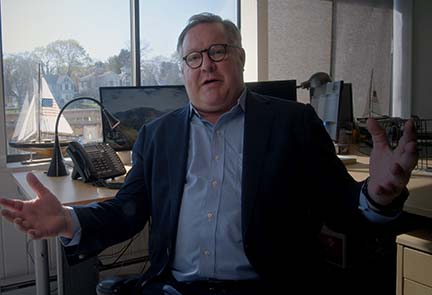
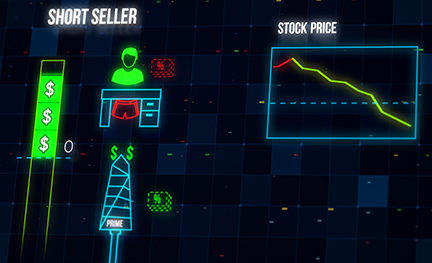
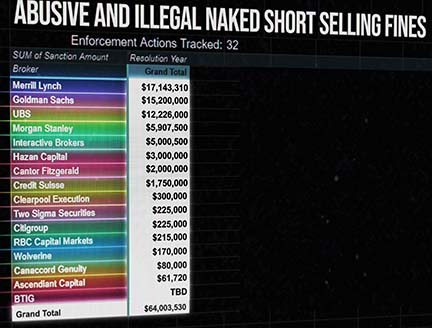
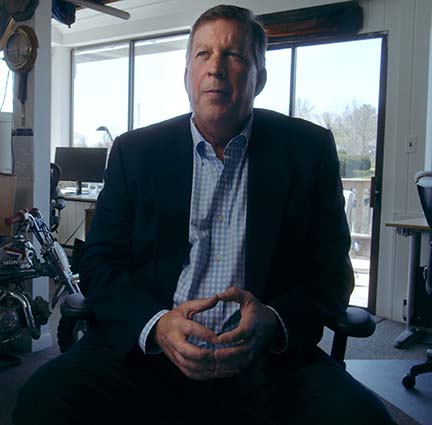
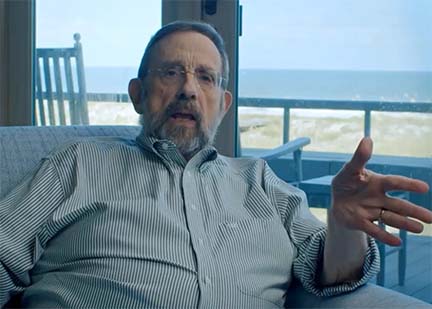
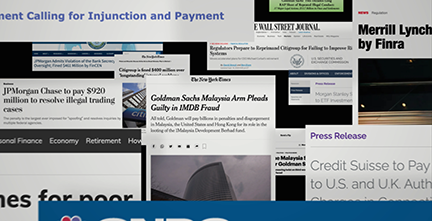
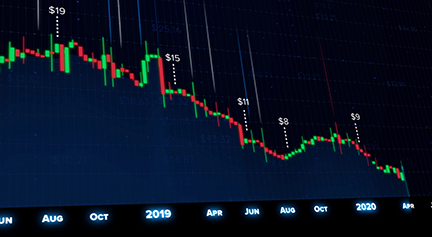
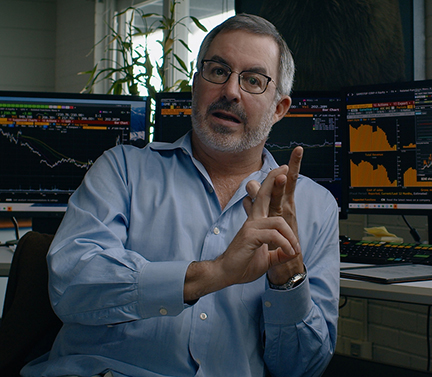
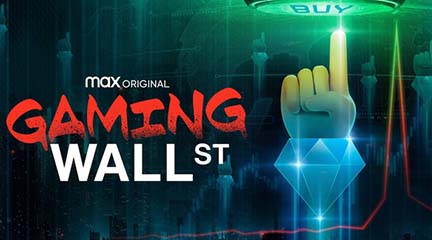
Brilliant! Thank you for your work exposing the criminals on wall street. They have been caught in their game and we are now watching the entire system crumble and about to explode. We must get this information out to the public, as their 401ks, pensions, etc are all being robbed by these criminal scumbags. They did it in 2008 and got a bail out. Of course they own Congress, what would one expect in the most corrupt financial system on earth? Kenny gives millions every week to buy his safety. DOJ investigation must reveal this and out these fuckers in prison. Without prison, nothing will change! No bail outs, let them all collapse, die, and send the primary culprits to prison!
Lucy, Please look into RDBX for us. Criminals are at it again! Threshold list for over 70 days, crazy crazy ftds and short interest.
LK: Alas, I don’t have the resources to investigate such cases. The company needs a lawyer. And should file complaints with the SEC and FINRA.
I’m new to your blog. Very informative.
It occurs to me that the numerous scenarios outlined in the article, create what, faux profits? Artificial money? Inflation? And taxes, of course, are paid on all this one way or another, right? Savagely protected by the IRS. No wonder the millionaires in Congress have no interest. Like narcotics, like pharma, like anything really, it’s all for sale. Any sense of morality is long gone.
Society is downhill from politics, now. We are all codependent in this scam one way or another. The decay we are experiencing in all walks of life is intertwined with this high level corruption. Unfortunately, there is no voting solution.
In my Faith, despair is a sin. So I leave all this to God, who may decide to just destroy it. So I’m done with voting and praying for change. I left banking, put my wealth in hard assets. Shop locally. I’m much happier.
I lost over $300k on a company called Sorrento Therapeutics (SRNE) when the stock went from $20.00/share during COVID down to under $1.00, into chapter 11BK and now trading for $0.05 on the expert market. FTD’s and naked short selling, corrupt judges in Houston southern district of Texas BK courthouse, it’s all there for the viewing but again, who’s going to expose the theft? It’s equivalent to piracy and an attack on retail investors. US entrepreneurs need capital to create new markets and innovations which grows our economy and brings prosperity but our government refuses to protect the stock market connection between retail investors and innovators. The hedge funds and private firms are getting away with it.